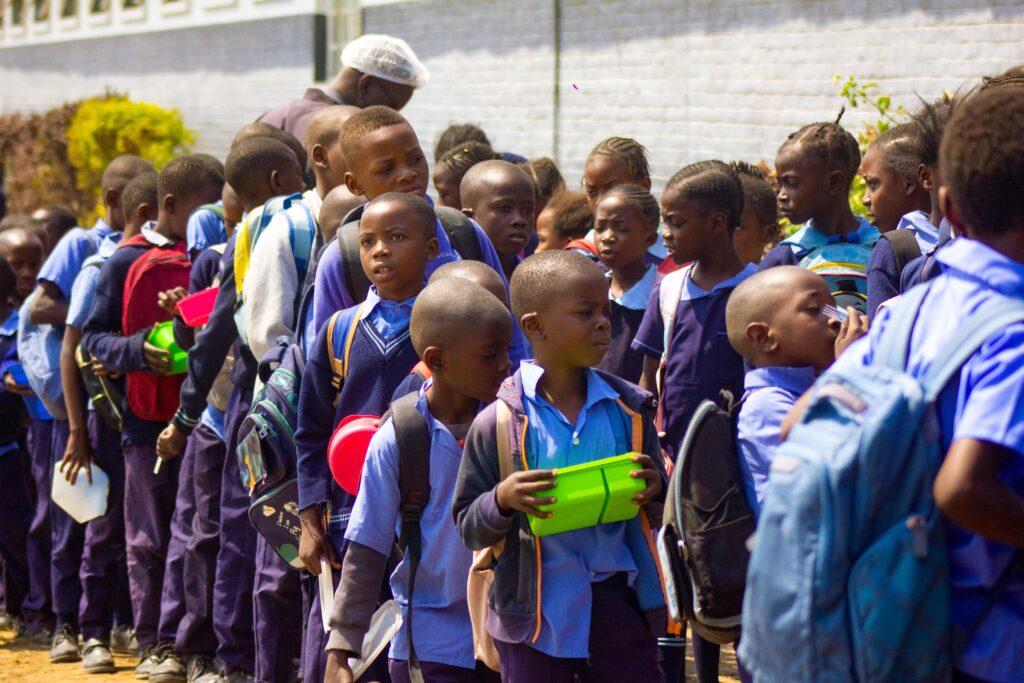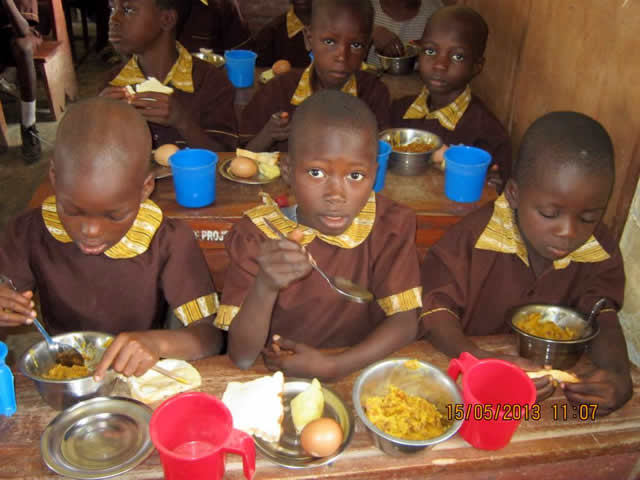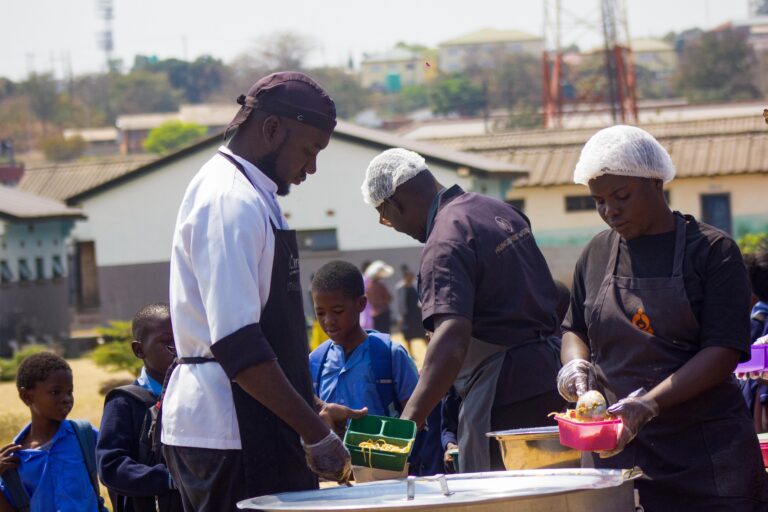Parents, teachers, and nutritionists say Zambia’s national school meals programme has made a remarkable impact, boosting children’s health and school attendance while creating jobs and attracting new partners. Yet, as Zambia’s story unfolds with promise, it serves as a quiet reminder to Nigeria, where a similar initiative has been suspended for more than a year.
By Annie Zulu, bird story agency and DevReporting
A morning without breakfast
At 5:30 a.m. in Lusaka’s Matero township, 13-year-old Christine Zimba was already awake, putting on her school uniform in the dim morning light. Her mother, Judith Sichone, quietly swept around their home. There was no breakfast that morning, just a cup of warm water to fill the belly.
At 6:00 a.m., Christine slung her school bag over her shoulder, waved goodbye to her mother, and stepped into the streets of Matero. She walked for thirty minutes to Mambilima Primary School. When she arrived on campus, she was a bit tired and hungry, but she was happy. The aroma of porridge drifted across the schoolyard. Christine smiled. For her, the porridge waiting for her was more than just food. It was sustenance and comfort. It gave her another reason to stay in school.
“Sometimes there’s no food at home, but when I come to school, I know I will eat. It helps me learn because I’m not hungry,” she said.
Christine, a soft-spoken grade seven pupil, loves reading and answering questions in class. She dreams of becoming a lawyer one day, to help people who cannot speak for themselves, she said. Her friend Craig Chigariro, 12, wants to be a surgeon. He said the school meals give him the energy he needs to pay attention in class. For both children, one simple plate of food has turned school into a place where they can truly build their futures.
Feeding attendance and ambition

At Mambilima Primary School, no child learns on an empty stomach anymore. The school was recently added in the latest phase of the national Homegrown School Feeding Programme, as the Zambian government pushes to reach all 116 districts by 2026 under the scheme, which currently provides meals to over 4.6 million school children in 106 districts across the country.
The school is also benefiting from a social welfare project of the Indian diamond company, Malabar Group, which began providing free meals at Mambilima in May 2025. The project, starting with an aim to give 10,000 meals daily to three Zambian schools, is supported by Zambia’s government and supplements the administration’s ongoing efforts to sustain child health.
Genesis of school feeding in Zambia
The school feeding programme began in Zambia in 2011. It was designed to fight school absenteeism. The then-Minister of Education, John Phiri, and Minister of Agriculture, Robert Sichinga, were instrumental in pushing the policy forward.
Before, the country’s public schools did not consistently offer meals to students. Assistant Director for school health and nutrition in Zambia’s Ministry of Education, Maybin Luulu, told bird, “Before the programme, school attendance in some areas was only 65 per cent, but after we introduced the meals, attendance rose to more than 85 per cent.”
He said the programme’s success is yielding more investments to expand it.
“In 2024, the budget was K111.7 million ($4,850,263). This year, it’s K534 million ($23,333,701). By 2026, all 116 districts will benefit,” he told bird.
The headmaster of Mambilima School, Abel Tembo, says the results of the initiative are clear.
“Before this programme, many pupils stayed away from school. Some would run off during break because they were hungry. But now, they stay, even attendance has improved, and parents are grateful because they don’t have to worry about lunch money,” Mr Tembo said.
The headmaster looked around the schoolyard where children sat under trees, finishing up their plates.
“This food has changed everything. It’s not just feeding them, it’s giving them hope,” he said.
At the rear end of the campus, smoke rose from large pots as Luckson Tembo and his team of cooks prepared meals for over 2,000 children.
“This programme is a blessing. Not every child eats before coming to school. So, when we serve them and see them smiling, it warms our hearts,” Mr Luckson said.
Mr Luckson paused to serve the children. “It’s not easy cooking for so many children, but it’s worth it. Their joy gives us energy.”
He noted that the programme has also created jobs for young people like him. “We’ve learned teamwork, big-batch cooking, and how to care for the kids,” he added with a grin. “It’s more than just cooking, it’s serving a community.”
More Than a Meal: Jobs, dignity, and discipline
Emeldah Chipalala, who has been a schoolteacher for 15 years, said the change has been remarkable. “Before the feeding programme, many children would doze off in class. Some would come crying from hunger, and others would run away at break time.”
“They are alert, focused, and excited to learn…even discipline has improved. If we tell them, ‘If you misbehave, you won’t go to eat,’ they behave immediately,” she said.
She laughed. “Food has become a teacher too.”
Back in Matero, Christine’s mother, Mrs Sichone, acknowledged that the meals programme is providing something that she often finds hard to do.
“There were days I sent her to school without food; it used to break my heart. But now, I’m at peace. I know she will eat. I know she will learn. This feeding programme is helping not just the children. It’s helping families like mine,” she noted.
All around, the programme has been widely approved across the country. Lusaka-based nutritionist and programme officer for Zambia’s Civil Society Scaling Up, Majory Chilufya, told bird, “It’s not just about being full, it’s about being healthy, alert and ready to learn. Feeding children properly is feeding the nation’s future.”
Back at Mambilima Primary School, the lunch bell rang. Students joyfully burst into the schoolyard and lined up in front of the steaming pots. The meal of the day, spaghetti.

In Nigeria, pots now run dry
Nigeria’s National Home-Grown School Feeding Programme (NHGSFP) was launched in 2005 under the administration of former President Olusegun Obasanjo to enhance the health and education of public primary school pupils using locally sourced farm produce for daily nutritious meals. Initially implemented in 12 states across the six geopolitical zones, it was suspended in 2007 due to poor planning, weak strategies, and funding challenges.
While the federal government could not continue in 2007, a new government, under the leadership of Rauf Aregbesola, who assumed office in Osun State after more than three years of legal battle over the 2007 governorship election in the state, reintroduced the school feeding project in April 2012.

Tagged: “Osun State Home-Grown School Feeding and Health Programme,” otherwise known as O’MEALS, the initiative, according to the government, covered the state’s then 1,375 elementary schools, with a population of about 250,000 pupils.
With a total of 3,007 caterers, the state claimed it was spending about N14.8 million per day, N74 million per week, and N325.6 million per month, and more than N3 billion annually to cater for the kids.
Thus, in 2016, at a national event to revive the programme by the administration of late President Muhammadu Buhari to boost school enrolment, reduce out-of-school children, and tackle child malnutrition, Mr Aregbesola was the cynosure of all eyes as he reeled out statistics on the significant impact of the programme on education standard in the state.
However, following allegations and counter-allegations of fraud rocking the social intervention programmes run by the National Social Investment Programme Agency (NSIPA), including the school feeding programme, in January 2024, President Bola Tinubu suspended the programme and all other social safety interventions by the agency.
The government launched a probe into alleged irregularities in the management of the agency and its activities. Eventually, it suspended the then Minister of Humanitarian Affairs, Beta Edu, who was overseeing the agency.
Before its suspension in January 2024, the programme had created about 34,869 direct jobs for cooks and other staff involved in the food preparation and distribution process. It indirectly supports the livelihoods of an estimated 80,000 farmers, 127,000 food vendors, and 100 aggregators across 30 states.
Vice President of Nigeria, Kashim Shettima, recently disclosed that Nigeria may require an annual budget of about N1 trillion to sustain nationwide coverage of the Home-Grown School Feeding Programme.
Despite a review of the programme by a panel set up in 2024, the initiative has yet to commence after its suspension. Findings by The Guardian revealed that N160 billion was set aside for the scheme in the N54.9 trillion 2025 budget.
However, stakeholders maintain that as inflation continues to erode the purchasing power of allocated funds, the programme’s administrators may be forced to either reduce the scope of the initiative or delay its implementation until additional funding can be secured. Though the federal government has said it is working to expand the school feeding programme to 50 million primary school pupils in 2026.
So, while Zambia’s children line up daily for a hot meal that keeps them in school, millions of Nigerian pupils wait for a promise yet to be fulfilled. As Zambia nourishes its future one bowl at a time, Nigeria is reminded that policies don’t just need budgets; they need continuity, transparency, and the political will to keep children learning.
bird story agency and DevReporting

